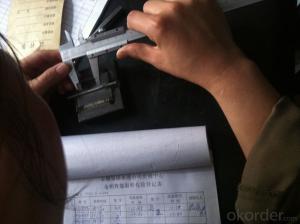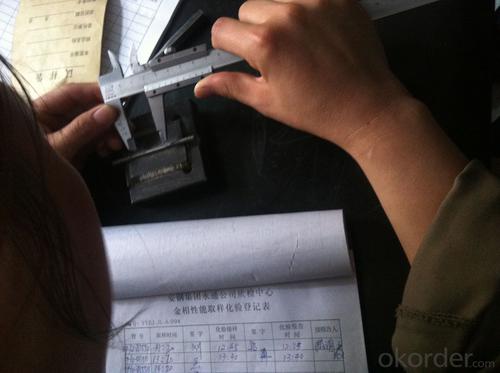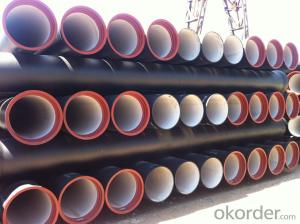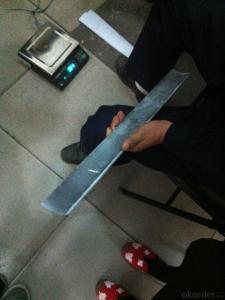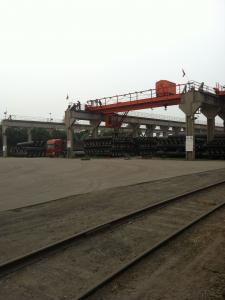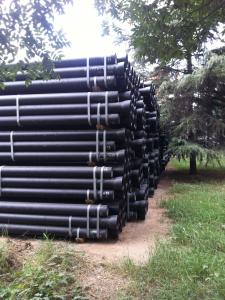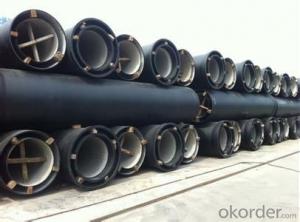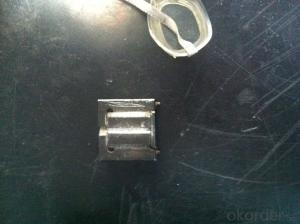DUCTILE IRON PIPEs K9 CLASS DN1200
- Loading Port:
- Tianjin
- Payment Terms:
- TT OR LC
- Min Order Qty:
- 32 pc
- Supply Capability:
- 3000 pc/month
OKorder Service Pledge
OKorder Financial Service
You Might Also Like
· Material : Ductile Cast Iron
· Size Range : DN 80mm to DN 2000mm
· Unit Effective Length : 6m or 5.7m
· Manufacture Standard: ISO 2531:1998/ EN 545:2006/EN 598:2007
· Annual capacity : 200,000 tons
· Coating Exterior: Zinc 130g/m2 according to ISO 8179-1 and bitumen coating 70 microns.
· Cement Interior: Portland Cement/ High Alumina Cement/ Sulphate Resisting Cement Lining according to ISO 4179
· Special requirements on external coating and internal lining can be applied
· We also provide accessories such as SBR/EPDM rubber gaskets, lubricant paste, pipe caps, PE sleeves, etc.
Additional Parts:
Each pipe is strictly inspected according to related standard to ensure permanently high performance.
Easy Installation at site and service free for life
Long Service Lifespan
Quotation will arrive you within 24hours once we get your inquiry.
We guarantee offering you a competitive price.
A copy of original inspection reports of pipes will be offered after shipment.
Photos of loading process will be sent to the customer after shipment effect.
We will follow-up the delivery progress after shipment effect and update to the customer on weekly basis.
- Q: Ductile iron pipes perennial bubbles in the water will rot it
- Water supply pipe is the first choice, with high cost performance. Compared with the PE pipe, from the installation time, ductile pipe PE pipe installation is simple and rapid, and after the installation of internal and external pressure bearing better tightness and corrosion resistance; from the point of view, ductile pipe sealing better after installation, but also can improve the corrosion resistance through various anti-corrosion methods;
- Q: How are ductile iron pipes repaired if they get damaged?
- Ductile iron pipes are repaired in a few different ways depending on the extent of the damage. Here are some common methods for repairing ductile iron pipes: 1. Spot Repair: If the damage is minimal and localized, a spot repair can be carried out. This involves cutting out the damaged section of the pipe and replacing it with a new section. The new section is typically joined to the existing pipe using mechanical couplings or flanged connections. 2. Pipe Lining: In cases where the damage is more extensive but the pipe is still structurally sound, pipe lining can be used. This involves inserting a liner into the damaged pipe, which creates a new smooth surface. The liner can be made of various materials such as epoxy or cured-in-place pipe (CIPP). This method avoids the need for excavation and replacement of the entire pipe. 3. Pipe Bursting: For severely damaged or deteriorated pipes, pipe bursting may be the best option. This process involves pulling a new pipe through the existing damaged pipe, simultaneously fracturing the old pipe and replacing it with a new one. This method is typically used when the existing pipe is beyond repair and needs complete replacement. 4. Welding and Patching: In certain cases, small leaks or cracks in ductile iron pipes can be repaired by welding or patching. Welding involves melting and fusing the metal together to seal the damaged area. Patching, on the other hand, involves applying a specialized epoxy or composite material over the damaged section to create a watertight seal. It is important to note that the repair method used will depend on factors such as the extent of the damage, accessibility to the pipe, and the expertise of the repair crew. In all cases, proper assessment, planning, and execution are crucial to ensure a successful and long-lasting repair.
- Q: What are the typical surge anticipation measures for ductile iron pipe?
- Some typical surge anticipation measures for ductile iron pipe include using surge tanks or pressure relief valves, installing air release valves and surge suppressors, using flexible joint connections, and designing the pipeline with appropriate wall thickness and reinforcement.
- Q: Can ductile iron pipes be used for underground storage tanks?
- Under specific circumstances, ductile iron pipes are appropriate for underground storage tanks. This material possesses strength and durability, effectively resisting corrosion and making it a suitable option for underground applications. Nevertheless, several factors must be taken into account before implementing ductile iron pipes for underground storage tanks. First and foremost, it is vital to evaluate the project's precise demands and regulations. Different regions and industries may enforce specific guidelines regarding the materials used in underground storage tanks. It is imperative to ascertain that ductile iron pipes comply with these regulations and meet the required standards for underground storage. Secondly, the size and capacity of the storage tank must be considered. Ductile iron pipes are available in various sizes, but their dimensions may not be suitable for large-scale storage tanks due to limitations. Consulting engineers or experts is necessary to determine the appropriate pipe size and capacity for the specific storage requirements. Lastly, the design and installation of the underground storage tank necessitate careful planning. Adequate measures should be taken to seal and protect against external factors such as soil movements, water pressure, or other potential hazards. Preventive actions should be implemented to avoid leaks or damage to the pipes, ensuring the safety and longevity of the storage tank. In conclusion, ductile iron pipes can be utilized for underground storage tanks, but it is crucial to consider the specific requirements, regulations, sizing limitations, and proper design and installation. Seeking guidance from professionals in the field and adhering to industry standards will ensure successful implementation of ductile iron pipes for underground storage tanks.
- Q: Are ductile iron pipes suitable for use in hydroelectric dams?
- Yes, ductile iron pipes are suitable for use in hydroelectric dams. Ductile iron is a type of iron that has a higher degree of flexibility and strength compared to traditional cast iron. This makes it an ideal choice for many applications, including water transmission systems in hydroelectric dams. Ductile iron pipes are known for their durability and resistance to corrosion, which is crucial in a dam environment where water exposure is constant. They can withstand high pressures and extreme temperatures, making them suitable for the demanding conditions found within hydroelectric dams. Additionally, ductile iron pipes have excellent joint integrity, ensuring that they remain leak-proof and reliable over their lifespan. This is important for maintaining the efficiency and effectiveness of a hydroelectric dam's water transmission system. Furthermore, ductile iron pipes are cost-effective compared to other materials, such as steel or concrete. They have a long service life, require minimal maintenance, and are readily available, making them a practical choice for hydroelectric dam projects. In conclusion, ductile iron pipes are a suitable choice for use in hydroelectric dams due to their durability, resistance to corrosion, high-pressure tolerance, joint integrity, and cost-effectiveness. They provide the necessary strength and flexibility to efficiently transport water within the dam, contributing to the overall success and longevity of the hydroelectric power generation system.
- Q: Can ductile iron pipes be used in marine environments?
- Ductile iron pipes are suitable for marine environments due to their excellent mechanical properties, high corrosion resistance, and durability. These pipes are made of a type of cast iron known as ductile iron, which can withstand the harsh conditions of marine environments. Marine environments are known for their high levels of corrosion caused by saltwater, humidity, and other harsh factors. However, ductile iron pipes are specifically designed to endure these conditions. They have a protective layer called the "graphite skin" that acts as a barrier against corrosion. This graphite skin prevents rust formation and safeguards the pipes from degradation. Additionally, ductile iron pipes can be further protected with coatings or linings to enhance their corrosion resistance in marine environments. These protective coatings, such as epoxy, polyurethane, or zinc coatings, provide an extra layer of defense against corrosion. This ensures the pipes' longevity and reliability in marine environments. To maintain optimal performance, regular maintenance and inspection are crucial for ductile iron pipes in marine environments. This includes regular cleaning to remove marine growth or debris that may accumulate on the pipes and conducting routine inspections to identify any signs of corrosion or damage. In conclusion, ductile iron pipes are a suitable choice for marine environments. Their inherent corrosion resistance, durability, and the ability to apply additional protective coatings make them ideal for various marine applications.
- Q: Can ductile iron pipes be used for large-scale irrigation systems?
- Yes, ductile iron pipes can be used for large-scale irrigation systems. Ductile iron pipes are known for their strength, durability, and resistance to corrosion, making them suitable for various applications including irrigation. These pipes are able to withstand high pressure and can handle the demands of large-scale irrigation systems. Additionally, ductile iron pipes have a long lifespan, reducing the need for frequent replacements and maintenance. They are also cost-effective compared to other materials used in irrigation systems. Therefore, ductile iron pipes are a suitable choice for large-scale irrigation systems due to their strength, durability, corrosion resistance, and cost-effectiveness.
- Q: Are ductile iron pipes available for cutting and are there any relevant specifications?
- Can be cut, the specification is based on the original specification, just for some engineering needs
- Q: What are the advantages and disadvantages of spheroidal graphite cast iron?
- Compared with cast iron, ductile iron has an absolute advantage in strength. The tensile strength of ductile iron is 60K, while the tensile strength of cast iron is only 31k. The yield strength of ductile iron is 40K, while the cast iron does not show yield strength, and eventually breaks. The strength to cost ratio of ductile iron is far superior to that of cast iron.
- Q: Can ductile iron pipe be recycled?
- Yes, ductile iron pipe can be recycled. Ductile iron is a type of iron that is commonly used in the manufacturing of pipes due to its high strength and durability. When a ductile iron pipe reaches the end of its useful life, it can be recycled by melting it down and using the molten iron to create new products. Recycling ductile iron pipe not only helps conserve natural resources but also reduces the need for raw materials and energy-intensive processes involved in manufacturing new pipes. Additionally, recycling ductile iron pipe helps minimize waste and contributes to a more sustainable and environmentally friendly approach to infrastructure development.
Send your message to us
DUCTILE IRON PIPEs K9 CLASS DN1200
- Loading Port:
- Tianjin
- Payment Terms:
- TT OR LC
- Min Order Qty:
- 32 pc
- Supply Capability:
- 3000 pc/month
OKorder Service Pledge
OKorder Financial Service
Similar products
Hot products
Hot Searches
Related keywords
